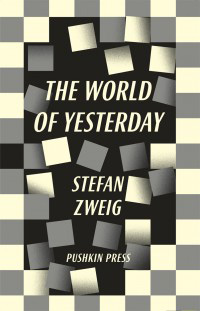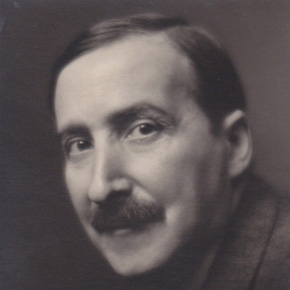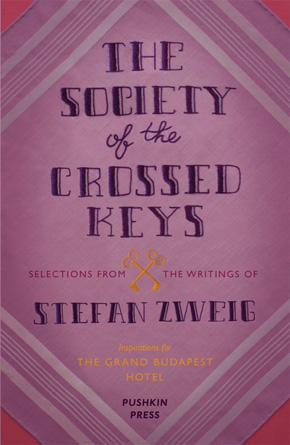Brightness and shadows over Europe
by Stefan ZweigAs everyone knows, it is a thousand times easier to reconstruct the facts of what happened at a certain time than its intellectual atmosphere. That atmosphere is reflected not in official events but, most conspicuously, in small, personal episodes of the kind that I am going to recount here. To be honest, I did not believe that war was coming at the time. But I twice had what might be called a waking dream of it, and woke with my mind in great turmoil. The first time was over the ‘Redl Affair’, which like many of those episodes that form a backdrop to history is not widely known.
Personally I knew Colonel Redl, the central character in one of the most complex of espionage dramas, only slightly. He lived a street away from me in the same district of Vienna, and once, in the café where this comfortable-looking gentleman, who appreciated the pleasures of the senses, was smoking his cigar, I was introduced to him by my friend Public Prosecutor T. After that we greeted each other when we met. But it was only later that I discovered how much secrecy surrounds us in the midst of our daily lives, and how little we really know about those who are close to us. This colonel, who looked very much the usual capable Austrian officer, was in the confidence of the heir to the throne. It was his important responsibility to head the army’s secret service and thwart the activities of their opposing counterparts. It came out that during the crisis of the war in the Balkans in 1912, when Russia and Austria were mobilising to move against each other, the most important secret item in the hands of the Austrian army, the ‘marching plan’, had been sold to Russia. If war had come, this would have been nothing short of disastrous, for the Russians now knew in advance, move by move, every tactical manoeuvre for attack planned by the Austrian army. The panic set off among the General Staff of the army by this act of treachery was terrible. It was up to Colonel Redl, as the man in charge, to apprehend the traitor, who must be somewhere in the very highest places. The Foreign Ministry, not entirely trusting the competence of the military authorities, also let it be known without first informing the General Staff – a typical example of the jealous rivalry of those organisations – that they were going to follow the matter up independently, and to this end gave the police the job of taking various measures, including the opening of letters from abroad sent poste restante, regardless of the principle that such correspondence was strictly private.
One day, then, a post office received a letter from the Russian border station at Podvolokzyska to a poste-restante address code-named ‘Opera Ball’. On being opened, it proved to contain no letter, but six or eight new Austrian thousand-crown notes. This suspicious find was reported at once to the chief of police, who issued instructions for a detective to be stationed at the post-office counter to arrest the person who came to claim the suspect letter on the spot.
The detective in charge of the case froze. The mystery was solved. Colonel Redl, the top espionage chief in the Austrian army, was also a spy in the pay of Russia.”
For a moment it looked as if the tragedy was about to turn into Viennese farce. A gentleman turned up at midday, asking for the letter addressed to ‘Opera Ball’. The clerk at the counter instantly gave a concealed signal to alert the detective. But the detective had just gone out for a snack, and when he came back all that anyone could say for certain was that the unknown gentleman had taken a horse-drawn cab and driven off in no-one-knew-what direction. However, the second act of this Viennese comedy soon began. In the time of those fashionable, elegant cabs, each of them a carriage and pair, the driver of the cab considered himself far too good to clean his cab with his own hands. So at every cab rank there was a man whose job it was to feed the horses and wash the carriage. This man, fortunately, had noticed the number of the cab that had just driven off. In quarter-of-an-hour all police offices had been alerted and the cab had been found. Its driver described the gentleman who had taken the vehicle to the Café Kaiserhof, where I often met Colonel Redl, and moreover, by pure good luck, the pocketknife that the cabby’s unknown fare had used to open the envelope was found still in the cab. Detectives hurried straight off to the Café Kaiserhof. By then the gentleman described by the cabby had left, but the waiters explained, as if it were the most natural thing in the world, that he could only be their regular customer Colonel Redl, and he had just gone back to the Hotel Klomser.
 The detective in charge of the case froze. The mystery was solved. Colonel Redl, the top espionage chief in the Austrian army, was also a spy in the pay of Russia. He had not only sold Austrian secrets and the army’s marching plan, it also instantly became clear why, over the last year, the Austrian agents he sent to Russia had been regularly arrested, tried and found guilty. Frantic telephone conversations began, finally reaching Franz Conrad von Hötzendorf, Chief of General Staff of the Austrian army. An eyewitness of this scene told me that on hearing the first few words he turned white as a sheet. Phone calls to the Hofburg palace ensued, discussion following discussion. What should be done next? The police had now made sure that Colonel Redl could not get away. When he was leaving the Hotel Klomser, and was giving the hotel porter some instructions, a detective unobtrusively approached him, offered him the pocketknife and asked, in civil tones, “Did you happen to leave this pocketknife in your cab, Colonel?” At that moment Redl knew that the game was up. Wherever he turned, he saw the familiar faces of secret policemen keeping watch on him, and when he returned to the hotel, two officers followed him up to his room and put a revolver down in front of him, for by now a decision had been reached in the Hofburg – the end of an affair showing the Austrian army in such an ignominious light would be best hushed up. The two officers stayed on duty outside Redl’s room in the Hotel Klomser until two in the morning. Only then did they hear the sound of the revolver being fired inside the room.
The detective in charge of the case froze. The mystery was solved. Colonel Redl, the top espionage chief in the Austrian army, was also a spy in the pay of Russia. He had not only sold Austrian secrets and the army’s marching plan, it also instantly became clear why, over the last year, the Austrian agents he sent to Russia had been regularly arrested, tried and found guilty. Frantic telephone conversations began, finally reaching Franz Conrad von Hötzendorf, Chief of General Staff of the Austrian army. An eyewitness of this scene told me that on hearing the first few words he turned white as a sheet. Phone calls to the Hofburg palace ensued, discussion following discussion. What should be done next? The police had now made sure that Colonel Redl could not get away. When he was leaving the Hotel Klomser, and was giving the hotel porter some instructions, a detective unobtrusively approached him, offered him the pocketknife and asked, in civil tones, “Did you happen to leave this pocketknife in your cab, Colonel?” At that moment Redl knew that the game was up. Wherever he turned, he saw the familiar faces of secret policemen keeping watch on him, and when he returned to the hotel, two officers followed him up to his room and put a revolver down in front of him, for by now a decision had been reached in the Hofburg – the end of an affair showing the Austrian army in such an ignominious light would be best hushed up. The two officers stayed on duty outside Redl’s room in the Hotel Klomser until two in the morning. Only then did they hear the sound of the revolver being fired inside the room.
Next day a brief obituary of the highly regarded officer Colonel Redl, who had died suddenly, appeared in the evening papers. But too many people had been involved in tracking him down for the secret to be kept. Gradually, moreover, details that explained a great deal in psychological terms came to light. Unknown to any of his superiors or colleagues, Colonel Redl’s proclivities had been homosexual, and for years he had been a victim of blackmailers who finally drove him to this desperate means of extricating himself from their toils. A shudder of horror passed through the entire army. Everyone knew that if war came, this one man could have cost the country the lives of hundreds of thousands, bringing the monarchy to the brink of the abyss. Only then did we Austrians realise how very close we had been to world war already during the past year.
People don’t realise what’s going on,’ she cried out loud in the street, although she usually spoke in quiet, kindly and composed tones. ‘Why don’t you young people do something?'”
That was the first time I felt terror take me by the throat. Next day I happened to meet Bertha von Suttner, the generous and magnificent Cassandra of our times. An aristocrat from one of the first families in the land, in her early youth she had seen the horrors of the Austro-Prussian War of 1866 come close to their hereditary castle in Bohemia. With the passion of a Florence Nightingale, she saw only one task in life for herself – preventing a second war, preventing war in general. She wrote a novel entitled Die Waffen nieder – Lay Down Your Arms – which was an international success; she organised countless pacifist meetings, and the great triumph of her life was that she aroused the conscience of Alfred Nobel, the inventor of dynamite. He was induced to make up for the damage his invention had done by setting up the Nobel Peace Prize to foster international understanding. She came towards me in a state of great agitation. “People don’t realise what’s going on,” she cried out loud in the street, although she usually spoke in quiet, kindly and composed tones. War was so close, and they were hiding everything from us and keeping it secret as usual. “Why don’t you young people do something? It’s more your business than anyone’s! Resist, close ranks! Don’t keep leaving everything to a few old women like us. No one listens to us!”
I told her that I was going to Paris, and perhaps we could try to draw up a joint manifesto there.
“Why ‘perhaps’?” she urged me. “Things look worse than ever, the wheels have begun turning.” Uneasy as I was myself, I had difficulty in calming her down.
But it was in France that a second, personal episode was to remind me how prophetically the old lady, who was not taken very seriously in Vienna, had foreseen the future. It was a very small incident, but it made a powerful impression on me. In the spring of 1914 I had left Paris, with a woman friend, to spend a few days in Touraine, where we were going to see the grave of Leonardo da Vinci. We had walked along the banks of the Loire in mild, sunny weather, and were pleasantly weary by evening. So we decided to go to the cinema in the rather sleepy town of Tours, where I had already paid my respects to the house in which Balzac was born.
It was a small suburban cinema, not at all like our modern picture palaces made of chromium and shining glass. Only a hall perfunctorily adapted for the purpose, and full of labourers, soldiers, market women, a crowd of ordinary people enjoying a gossip and blowing clouds of Scaferlati and Caporal tobacco smoke into the air, in defiance of a No Smoking sign. First on the screen came a newsreel – ‘News From All Over the World’. A boat race in England; the people talked and laughed. Then a French military parade, and again the audience took little notice. But the third item was entitled: ‘Kaiser Wilhelm Visits Emperor Franz Joseph in Vienna’. Suddenly I saw on the screen the familiar platform of the Westbahnhof in Vienna, an ugly railway station building, along with a few policemen waiting for the train to come in. Then a signal was given, and old Emperor Franz Joseph walked past the guard of honour to welcome his guest. As the old Emperor appeared on the screen, stooping slightly and not entirely steady on his feet as he passed the line of men, the audience in Tours smiled kindly at the old gentleman with his white side whiskers. Then there was a picture of the train coming in, the first, the second and the third carriages. The door of the saloon car was opened, and out stepped Wilhelm II, the ends of his moustache bristling, wearing the uniform of an Austrian general.
At the moment when Kaiser Wilhelm appeared in the picture a storm of whistling and stamping broke out entirely spontaneously in the dark hall. Everyone was shouting and whistling, men, women and children all jeering as if they had been personally insulted. For a second the kindly people of Tours, who knew nothing about the world beyond what was in their newspapers, were out of their minds. I was horrified, deeply horrified. For I felt how far the poisoning of minds must have gone, after years and years of hate propaganda, if even here in a small provincial city the guileless citizens and soldiers had been roused to fury against the Kaiser and Germany – such fury that even a brief glimpse on the screen could provoke such an outburst. It was only a second, a single second. All was forgotten once other pictures were shown. The audience laughed heartily at the comedy that now followed, slapping their knees loudly with delight. Only a second, yes, but it showed me how easy it could be to whip up bad feeling on both sides at a moment of serious crisis, in spite of all attempts to restore understanding, in spite of our own efforts.
Who knows how many will stand firm once the posters ordering mobilisation go up? We have entered a time of mass emotion, crowd hysteria, and we cannot see yet what power it will have if war comes.”
The entire evening was spoilt for me. I couldn’t sleep. If it had happened in Paris, it would have made me just as uneasy, but it would not have shaken me so much. However, seeing how far hatred had eaten into the kindly, simple people here in the depths of the provinces made me shudder. In the next few days I told the story of this episode to many friends. Most of them didn’t take it seriously. “Remember how we French mocked stout old Queen Victoria, and two years later came the Entente Cordiale with Britain. You don’t know the French; they don’t feel deeply about politics.” Only Rolland1 saw it in a different light. “The simpler the people, the easier it is to win them over. Things have looked bad since Poincaré was elected. His journey to Petersburg will not be a pleasure jaunt.” We talked for a long time about the International Socialist Congress that had been fixed for that summer in Vienna, but here too Rolland was more sceptical than most. “Who knows how many will stand firm once the posters ordering mobilisation go up? We have entered a time of mass emotion, crowd hysteria, and we cannot see yet what power it will have if war comes.”
But, as I said earlier, such moments of anxiety passed by like gossamer blowing in the wind. We did think of war now and then, but in much the same way as one sometimes thinks of death – a possibility but probably far away. And Paris was too beautiful at that time, and we ourselves too young and happy to think of it much. I still remember a delightfully farcical ceremony devised by Jules Romains in which the idea of a prince des poètes was to be superseded by the crowning of a prince des penseurs, a good if rather simple-minded man who let the students lead him to the statue of Rodin’s Thinker outside the Panthéon. In the evening we made merry like schoolboys at a parody of a banquet. The trees were in blossom, the air was sweet and mild; who wanted to think of something as unimaginable as war in the face of so many pleasures?
My friends were more my friends than ever, and I was making new friends too in a foreign land – an ‘enemy’ land. The city was more carefree than ever before, and we loved its freedom from care along with our own. In those final days I went with Verhaeren to Rouen, where he was to give a reading. That night we stood outside the cathedral, its spires gleaming station, where one of the railway engines he had celebrated in verse was to crush him two years later, we said our goodbyes. Verhaeren embraced me. “I’ll see you on the first of August at Caillou qui Bique!” I promised to be there. I visited him at his place in the country every year to translate his new poems, working in close collaboration with him, so why not this year too? 2 I said goodbye to my other friends without a care, goodbye to Paris, an unsentimental goodbye such as you say to your own house when you are just going away for a few weeks. My plan for the next few months was clear. I was off to Austria, to somewhere secluded in the country to get on with my work on Dostoevsky (which as things turned out could not be published until five years later), and thus complete my book on Three Masters of Their Destiny, depicting three great nations through the work of their greatest novelists. Then I would visit Verhaeren, and perhaps make my long-planned journey to Russia in winter, to form a group there as part of our movement for intellectual understanding. All lay plain and clear before me in this, my thirty-second year; that radiant summer the world offered itself like a delicious fruit. And I loved it for the sake of what it was now, and what it would be in an even greater future.
Then, on 28th June 1914, a shot was fired in Sarajevo, the shot that in a single second was to shatter the world of security and creative reason in which we had been reared, where we had grown up and were at home, as if it were a hollow clay pot breaking into a thousand pieces.
From The World of Yesterday in the new anthology The Society of Crossed Keys selected by Wes Anderson and published by Pushkin Press. Translated by Anthea Bell.
1 Romain Rolland (1866–1944), French dramatist, novelist, essayist, art historian, musicologist, mystic and Nobel laureate, author of the ten-volume novel sequence Jean-Christophe (1903–1912).
2 Emile Verhaeren (1855–1916), Belgian poet and one of the chief founders of Symbolism. He was run over by a train and died at Rouen station.
 Stefan Zweig was born in 1881 in Vienna, studied in Berlin and Vienna and first became known as a poet and translator, then as a biographer. He travelled widely, living in Salzburg between the wars, and published a string of hugely popular novellas including Twenty-four Hours in the Life of a Woman, Letter from an Unknown Woman, Amok and Fear. In 1934, with the rise of Nazism, he moved to London, where he wrote his only finished novel, Beware of Pity, and later to Bath, taking British citizenship after the outbreak of the Second World War. With the fall of France in 1940 Zweig left Britain for New York, before settling in Brazil, where in 1942 he and his wife were found dead in an apparent double suicide. He had posted the manuscript of The World of Yesterday to his publisher the previous day. Much of Stefan Zweig’s work is published by Pushkin Press. Read more.
Stefan Zweig was born in 1881 in Vienna, studied in Berlin and Vienna and first became known as a poet and translator, then as a biographer. He travelled widely, living in Salzburg between the wars, and published a string of hugely popular novellas including Twenty-four Hours in the Life of a Woman, Letter from an Unknown Woman, Amok and Fear. In 1934, with the rise of Nazism, he moved to London, where he wrote his only finished novel, Beware of Pity, and later to Bath, taking British citizenship after the outbreak of the Second World War. With the fall of France in 1940 Zweig left Britain for New York, before settling in Brazil, where in 1942 he and his wife were found dead in an apparent double suicide. He had posted the manuscript of The World of Yesterday to his publisher the previous day. Much of Stefan Zweig’s work is published by Pushkin Press. Read more.
Anthea Bell is a translator of German and French literature including W.G. Sebald’s Austerlitz, for which she won the Independent Foreign Fiction Prize in 2002, the much-loved Asterix books, and numerous Stefan Zweig books for Pushkin Press including Burning Secret, for which she won the Schlegel-Tieck Prize in 2010.



